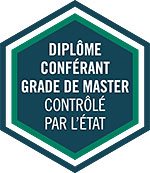ENS Paris-Saclay degree
The ENS Paris-Saclay Degree is equivalent to a Master's degree. It is awarded after four years of studies.
Each École Normale student takes an active role in their course project. They set out how they intend to acquire the expertise in their discipline, through a specialised training course. Over the four years, they enjoy individual supervision from the École Normale’s teaching team.
The degree
Applicants can be admitted onto the degree course:
- via a competitive entrance exam following preparatory classes for the Grandes Écoles. École Normale students are probationary-official students and receive a salary as a result.
- through a dossier, at the start of M1. Successful applicants are classified as École Normale students rather than officials.
ENS Paris-Saclay degrees are structured around a common foundation of 4 skills and a chosen specialised programme during the final year.
During the four-year course, students obtain 300 ECTS credits (minimum), with around 230 ECTS credits obtained from studying the core course.
The common foundation component of the course
The common foundation component of the course is useful for all École Normale students. It is made up of the following components:
- A 3-year enhanced disciplinary course (undergraduate degree year 3 - L3, 1st year Master’s degree - M1, and 2nd year Master’s degree - M2) in order to prepare students to study doctorates;
- Degree talks linked to social issues, teaching and research;
- A general English language programme to help students demonstrate high-level proficiency and obtain an “advanced” Cambridge diploma;
- A programme to prepare students for publishing international scientific papers (SWAP Module, scientific writing assessment programme);
- An initial immersive research experience.
The 4 skills
The degree is structured around activities which reinforce the core course and demonstrate four skills. École Normale students must demonstrate each of these skills.
The “Research” skill
High-level training in scientific research is provided, particularly through immediate laboratory immersions. École Normale students are all invited to undertake research. Therefore, immersive research experiences are offered very early on during the École Normale course, in the first year (undergraduate degree year 3 (L3) level) and/or in the second year (1st year Master’s degree (M1) level) in the school’s laboratories or external laboratories, in France or abroad.
The “Higher Education” skill
Thanks to the teaching practices experienced through the course, students can start working in teaching. These practices include teaching internships, knowledge sharing, tutoring and more.
The “Multidisciplinarity” skill
This skill enables students to look into other disciplines not covered by their original department. It is explored through collaborative cross-disciplinary projects, transversal modules offered by the school relating to science, technologies and companies, and more.
The “International” skill
In order to give École Normale students the skills to be able to work internationally, ENS Paris-Saclay has chosen to place emphasis on international mobility and proficiency in English as part of its degree. Proficiency in the international language of scientific and technical communication is obligatory for each École Normale student through a semester (equivalent to undergraduate degree year 3 (L3), 1st year Master’s degree (M1) or 2nd year Master’s degree (M2)) abroad, or an immersive experience abroad lasting at least two months.
Specialised programmes for École Normale students
A specific year is spent studying a chosen specialised programme:
The “International Research” programme
This programme enables École Normale students to undertake research in an area relating to their discipline as part of a team abroad.
The “Higher Education and Research” programme
This programme is aimed at students wishing to move towards higher education.
The “Interface” programme
This programme is mainly for École Normale students who would like to focus on multi-disciplinary skills. Following their 2nd year Master’s degree (M2), they may choose to undertake another year-long course in another discipline at ENS Paris-Saclay or enter another ENS Paris-Saclay or Université Paris-Saclay partner institute.
The “Artificial Intelligence” programme
This programme is aimed at École Normale students who have studied a pre-Master’s course in mathematics or computer sciences and are hoping to become specialist developers. In order to apply for this specialised programme, students must demonstrate strong interest in AI, based on the demands of this course.
Innovative teaching
Original teaching tools within the course: tutoring, projects to create teaching tools, knowledge sharing and more.
Student collaborative projects promoting interdisciplinarity.
Personalised courses, with approved tailored activities based on each student’s profile and ambitions.
Optional additional activities
The degree places emphasis on École Normale students getting involved in charitable work and activities that would enable them to discover the working world (such as administrative, industrial and specialised activities), therefore providing each École Normale student with a very unique and varied course. This charitable work and work experience is optional.

